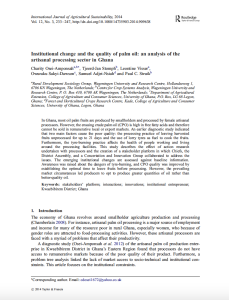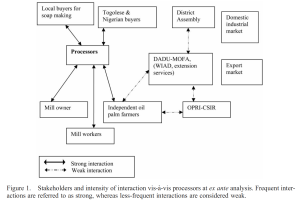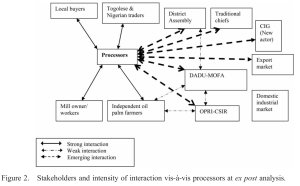
Elaeis guineensis or known as oil palm was first classified by Nicolaas Jacquin in 1763. This plant is indigenous to West Africa and flourishes between 12 degrees north and 12 degress south of the equator. The oil palm can be found as grove or forest plant which spread from Sierra Leone to Congo. The fruits produced by the oil palm contain fleshy outer pericarp, from which red palm oil is produced, and an inner kernel from which palm oil kernel is derived. The palm oil is great use for the West Africans, from an important source of vitamins, particularly vitamin A in their diet or cuisine. It also used for lighting and bodily ointment, while the palm tree itself provides material for building, such as roof thatching, and for brushes, as well as being the source of palm wine.
For ages, the West Africans use two traditional methods to extract red palm oil. First, treading with feet and washing with water to extract the floating red oil from the pulp. Or heating of the kernel nuts in a saucepan to extract kernel oil. All of this is mostly produced in an artisanal process of smallholder farmer.
On this first blog post, I will try to review a journal article written by Charity Osei-Amponsah (rural sociologist), Tjeerd-Jan Stomph (plant scientist), Leontine Visser (anthropologist), Owuraku Sakyi-Dawson (agriculture economist), Samuel Adjei-Nsiah (agriculturalist) and Paul C. Struik (crop physiologist) about Institutional change and the quality of palm oil: an analysis of the artisanal processing sector in Ghana. This article was published in the International Journal of Agricultural Sustainability in 2014.

The study by Osei-Amponsah et al (2014) is conducted in the Kwaebibirem district, 3 hours by car to northwest of the Ghana capital, Accra. The people of Kwaebibirem district are peasant farmers, who depend on rain-fed irrigation, labor intensive, and traditional farming methods, which dominant tribe is Akan.
Osei-Amponsah et al (2014) stated that artisanal palm oil processing is a major source of employment and income for many of the resource poor in rural Ghana, especially women, who because of gender roles are attracted to food-processing activities. Their previous study in 2012 found that the artisanal palm oil processor in Kwaebibirem district in Ghana’s eastern region do not have access to remunerative markets because of the poor quality of the product. Artisanal palm oil producers who are also smallholder’s farmer suffer from low productivity not only because they are without skills, but most importantly because they do not have available incentives or windows of opportunity to raise their productivity (IFAD, 2003). The conditions make the role of institutions have a crucial influence on agricultural productivity and economic development because its absence may create disincentives and unduly restrict opportunities for growth (OECD, 2006).
The research conducted by Osei-Amponsah et al seeks to fill this gap by focusing on the importance of institutional changes for the artisanal palm oil processor in Kwaebibirem. In their research, Osei-Amponsah et al (2014) emphasize that institutional changes are needed to facilitate policy formulation which are embedded not only in the socio-technical but also in the institutional context of the producer to ensure innovation and sustainability. The fundamental institutional constraints may reduce the artisanal palm oil productivity and, in the long run will hamper sustainability.
To obtain answers for these research problems, Osei-Amponsah et al used mixed methods between qualitative and quantitative by comparative case study design which involving ex-ante and post-ante analysis. The duration of the research was carried out for two years to assess emergent institutional changes between the control and the experimental groups. Osei-Amponsah et al (2014) try to focus on the organizational practices, processes, and innovations observed in selected artisanal palm oil processing mills. In addition, they conduct an analysis from tree angles: the constraints identified, the entrepreneurs and instruments used to address the constraints, and the initiatives for institutional change identified during the study period. The study conducted by Osei-Amponsah et al in Kwaebibirem, Ghana was not only interdisciplinary involving research team members from various disciplines, but also transdisciplinary which involved other stakeholders from NGOs, farmers, tribal chiefs to district agricultural department officer.
Overall, there are six stages in the research designed by Osei-Amponsah et al (2014) The first stage are exploratory diagnostic and baseline studies. In this stage, they used focus group discussions, key informants, and personal interviews to collect comprehensive data on the palm oil industry in Ghana. The second stage is setting up stakeholders’ platform. A local stakeholders’ platform was formed from among the participants who attended the workshop held by the Osei-Amponsah et al in collaboration with researcher from Convergence of Sciences - Strengthening Agricultural Innovation Systems (CoS-SIS) programs. The third stage is analysis at workshop. The topics discussed are related to institutional constraints and technical social factors needed to improve the quality of artisanal palm oil production which is currently still considered poor. Furthermore, the GIG platform was created as the fourth research stages in study of Osei-Amponsah et al (2014). The main aim of this platform is to provide artisanal palm oil processors link to the remunerative markets.
In the fifth research stage they make joint experimentation group to facilitate knowledge sharing and peer learning. This activity to assess the relationship between oil palm fruit storage time and variation of quality and yield of the crude palm oil. The experiments studied the effect of four different fruit storage periods (3, 7, 14, and 21 days) on yield and free fatty acids levels of artisanal palm oil produced. The volume and weight of palm oil produced from each storage period were recorded and then samples were analyzed in a laboratory.
The final stage is ex post data collection. Osei-Amponsah et al use semi-structured questionnaires and interviews with the key informants, artisanal mill processors, mill owners, and mill workers to understand palm oil production activities two years earlier at processing mills in the control towns. There are four main institutional constraints were identified: long fruit storage before processing, limited knowledge sharing and interaction among key actors, lack of a regulatory framework leading to the use of tires as fuel to boil oil palm fruits, and poor access to remunerative palm oil markets.
Based on the ex-post data, Osei-Amponsah et al create mapping of stakeholders to make comparison of interaction activities between stakeholders at different institutional levels (as illustrated in Figure 1 and Figure 2). They believe that institutional change innovation occurs not only through academics, but also through interactions among many different stakeholders addressing a particular problem. The study found that is a general lack of investment in artisanal Agri-processing research and development because policymakers, scientists, and industrialists consider this type of processing to be ineffective.


References
Charity Osei-Amponsah, Tjeerd-Jan Stomph, Leontine Visser, Owuraku Sakyi-Dawson, Samuel Adjei-Nsiah & Paul C. Struik (2014). Institutional change and the quality of palm oil: an analysis of the artisanal processing sector in Ghana, International Journal of Agricultural Sustainability, 12:3, 233-247, DOI: 10.1080/14735903.2014.909638.
IFAD, 2003. Transforming rural institutions in order to reach the millennium development goals. Discussion Paper. Rome: International Fund for Agricultural Development.
OECD, 2006. Do institutions block agricultural development in Africa? Policy Insights, 17 [online]. Available from: http://www.oecd.org/dev/insights

